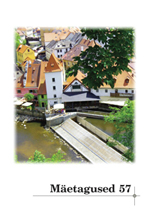Paremäärmuslik sõnavabadus eesti rahvusradikaalide veebisuhtluses
Extreme Right Freedom of Speech in Estonian Radical Nationalists’ Online Communication
Author(s): Andreas Ventsel, Mari-Liis MadissonSubject(s): Customs / Folklore
Published by: Eesti Kirjandusmuuseum
Keywords: cultural semiotics; Essex School of discourse theory; extreme right; identification in hypermedia; ratification of ACTA; self-model
Summary/Abstract: The article focuses on the processes of identification in hypermedia, trying to explicate the strategies of self-description that prevail on the websites of the activists of the Estonian extreme rights. The extreme right movements tend to use generally accepted discourses for the purpose of legitimising their own ethnocentric media practices. Extreme nationalist ideas form equivalences with concepts from the discourse of multiculturalism (‘justice’, ‘freedom’, ‘democracy’, ‘freedom of speech’), though at first sight they are incompatible. To explain this paradoxical situation, the authors employ the concepts of the hegemonic logic of signification and the empty signifier, as elaborated by Laclau, as well as the theoretical framework of cultural semiotics. The case-study is based on the extraordinarily forceful public feedback that followed the discussions about ACTA ratification in Estonia. ‘Information-freedom’ became an ambiguous core signifier: it played an important part in public discussions, but it also had a central role in the self-descriptions of Estonian radical nationalists. NO ACTA functioned in this case as an empty signifier, which united into a discursive whole these contradictory signifiers and self-models. The concept of a self-model is useful for explaining why some signifiers have a greater potential to become discursive dominants. It seems that in Estonian extreme-right meaning creation there are certain relations of equivalence between signifiers that are more likely to aggregate the discourse than the others, and these depend on the abstract level of the self-model.
Journal: Mäetagused. Hüperajakiri
- Issue Year: 2014
- Issue No: 57
- Page Range: 69-90
- Page Count: 22
- Language: Estonian

